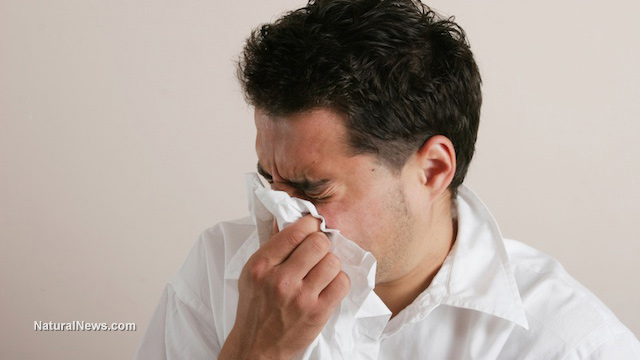Nature's vaccines: Acquiring pneumonia bacteria before flu infection actually reduces impact of disease
Friday, July 11, 2014 by: Julie Wilson
Tags: natural immunity, pneumonia bacteria, flu infection

- Newly released JFK files reveal Pentagon's role in creating Lyme disease and covid in the same lab
- Kiss Your Genetic Privacy Good-Bye! 23andMe Gets Green Light to Sell Your Intimate Genetic Details to Anyone They Want
- Sugar-free deception: Artificial sweeteners hijack hunger signals, fuel obesity epidemic, study warns
- Discovery of vast underground city beneath Giza pyramids challenges human history
- Black cumin seed oil emerges as a powerful ally against breast cancer and chronic inflammation
- Dr. Suzanne Humphries makes bombshell appearance on Joe Rogan podcast, exposing vaccine industry deception back to POLIOMYELITIS
- Sweden's migrant crisis deepens as failed green energy venture leaves thousands jobless, exposes systemic collapse
- Analysis: The coming economic collapse, a mass uprising and Trump's three secret weapons to halt the growing revolt
- Is the vaccine-autism debate reopening? Washington Post sparks controversy with preemptive hit piece on David Geier
- A handful of pecans a day could keep heart disease at bay, study finds
- Challenging the status quo: “America Fooled” by Timothy Scott exposes the myths about antidepressants
- RFK Jr. slashes HHS bureaucracy, saves taxpayers $1.8B while refocusing on chronic disease epidemic
- Woman contracts WORLD'S DEADLIEST VIRUS after unknowingly being given the WRONG VACCINE
- AI breakthrough slashes celiac disease diagnosis time from months to minutes
- Pediatric dentist exposes fluoride dangers as more states ban toxic water additive
- Aluminum pollution: A silent threat to human health
- Cauliflower: From ancient crop to modern superfood
- Catastrophic 7.7 earthquake devastates Myanmar and Thailand; death toll could reach 100,000
- Newly released JFK files reveal Pentagon's role in creating Lyme disease and covid in the same lab
- Analysis: The coming economic collapse, a mass uprising and Trump's three secret weapons to halt the growing revolt
- Trump nominates VACCINE ZEALOT Susan Monarez to lead the CDC, sidelining RFK Jr.'s reform efforts
- Trump's greatest betrayal so far: Accelerating Middle East wars, silencing dissent, and serving Zionist masters
- Dr. Mike Yeadon releases 15-minute testimony - WATCH - about genocidal intent of COVID “vaccines”
- Festive flavors: The sweet history, nutritional profile and health benefits of pecan pie
- Elon Musk: Aliens could be here on Earth RIGHT NOW
- Big Pharma's $8 Billion bribery scheme exposed: how doctors are pushed to prescribe junk science, not heal
- 5 Simple steps to boost your brainpower: How to strengthen executive function in a distracted world
- Trump reverses course on Gaza plan, says “nobody is expelling Palestinians”
- A lack of integrity in Academia: Harvard professor found GUILTY of fraudulent research to promote CRT theory
- Reclaim your health: How midlife exercise reverses years of inactivity
- Survival 101: Effective EMF blocking techniques
- Florida takes a stand: DeSantis proposes permanent ban on mRNA vaccine mandates
- Sugarcane extract superior to cholesterol-lowering drugs?
- California's social media censorship law struck down: A victory for free speech or a threat to online safety?
- OpenAI whistleblower who dissented against how the company trained ChatGPT found dead
- EPA advisor admits the agency is funneling billions to climate groups ahead of Trump’s return to White House
- EPA advisor admits the agency is funneling billions to climate groups ahead of Trump’s return to White House
- Newly released JFK files reveal Pentagon's role in creating Lyme disease and covid in the same lab
- California's social media censorship law struck down: A victory for free speech or a threat to online safety?
- Dr. Mike Yeadon releases 15-minute testimony - WATCH - about genocidal intent of COVID “vaccines”
- The Health Ranger releases “Vaccine Zombie” song and music video, using AI-animated zombies for the music video
- The pandemic as a tool for INDOCTRINATION: Understanding “The Indoctrinated Brain” by Dr. Michael Nehls
- Florida takes a stand: DeSantis proposes permanent ban on mRNA vaccine mandates
- “Why we influenced the 2020 elections”: Facebook files reveal the coordinated effort to bury the Hunter Biden laptop story
- Mike Adams releases country western hit single: Goin’ Back in Time is Comin’ Home
- Mike Adams releases music poetry sensation: A Child of God
- Unpacking the Lies That We’ve Been Fed – new song and music video released by Mike Adams, the Health Ranger
- Michigan sheriff announces criminal investigation into 2020 election crimes, Dominion Voting Systems
- Migrants are taking advantage of recent hurricanes to scam residents and loot their homes
- House Intelligence Committee calls for the ARREST and PROSECUTION of Dr. Anthony Fauci
- RFK Jr. clears key hurdle: Sen. Susan Collins backs controversial HHS nominee, signaling a new era for health policy
- Rep. Nancy Mace introduces bill to ban biological males from female facilities on federal property
- Peter Rost exposes Big Pharma corruption in his book “The Whistleblower: Confessions of a Healthcare Hitman”
- Mike Adams releases new song and music video: Nothing More Disgusting Than a Globalist
- Red Cross issues warning to stop blood plasma donations from vaccinated people
- Scientists confirm: GENIUS brain function can be spontaneously unleashed in humans without any apparent cause
- EPA advisor admits the agency is funneling billions to climate groups ahead of Trump’s return to White House
- HYSSOP: What research reveals about the health benefits of this ancient holy herb
- Two containers with completed ballots fall out of truck in Florida
- Fully vaccinated about to see “tsunami” of illness and death, warns virologist
- Global leaders unite to clamp down on “misinformation” with UN-backed Cascais Declaration
- BREAKING: 2025 NDAA authorizes mandatory military draft of WOMEN across America… as Pentagon pursues global NUCLEAR war with both Russia and China at the same time
- Michael Yon warns of a ZIONIST TAKEOVER in Trump’s second administration
- BOMBSHELL: DNA testing kits are a SCAM to develop ethnic-specific bioweapons
- Ozempic and Wegovy weight loss drugs are injectable LIZARD VENOM PEPTIDES that may unleash a devastating wave of organ failure… side effects align with symptoms of SNAKE BITES
- Israeli soldiers accused of even more torture and abuse in the West Bank
- These 13 countries just signed an agreement to engineer a global FAMINE by destroying food supply
- NASA admits that climate change occurs because of changes in Earth’s solar orbit, and NOT because of SUVs and fossil fuels
- RFK Jr. clears key hurdle: Sen. Susan Collins backs controversial HHS nominee, signaling a new era for health policy
- Sermon 30: How Jesus reveals Caesar’s FAKE CURRENCY and FALSE AUTHORITY
- Coriander seeds: Ancient medicine backed by modern science
- Arizona officials claim Maricopa County needs 10-13 days to tabulate results of the election
The latest research involving influenza proves yet again that nature is one of our biggest allies when it comes to fighting infectious disease, this time in ways you probably wouldn't have suspected.
A team of scientists based at the Wistar Institute, a international hub for biomedical research specializing in cancer analysis and vaccine development, discovered that contracting a respiratory infection prior to the flu may actually help protect you against a bad case of the infection.
A press release by the Wistar Institute described how the protein pneumolysin, a virulence factor of the gram-positive bacteria Streptococcus pneumonia, might protect macrophages -- immune cells that initiate defenses -- in the alveoli of the lungs, thus providing protection and offering immunity from inflammation, in turn preventing pneumonia.
The findings, which will appear in the August issue of the journal Virology, used mice to model influenza infections and found that the animals that were "colonized by Streptococcus pneumonia ten days prior to exposure to influenza were significantly less likely to develop severe disease or pneumonia than mice who were not colonized by the bacteria."
However, the mice that were exposed to the flu before a secondary pneumococcal infection exhibited worsened symptoms, becoming more ill than the mice that contracted the diseases in the reverse order.
Despite attempts made by government health officials to fraudulently market the flu vaccine as the answer to avoiding contraction of the infection, scientists warn that influenza still has the power to take lives.
"Influenza remains a major killer, and there is a preponderance of evidence, both scientific and historical, to show how secondary bacterial infections can be fatal," said Jan Erikson, Ph.D., professor at the Wistar Institute. "However, pneumococci often colonize the respiratory tract asymptomatically, particularly in children, leading us to consider how pre-colonization would impact a subsequent influenza infection."
During the investigation, researchers learned that the mice first exposed to pneumococci showed signs of decreased inflammation in the lungs following influenza infection.
The mice were still able to contract the virus, but the response to the infection changed in a way that prevented them from distributing signs of illness.
Attempting to learn how this was possible, researchers used mutant strains of pneumococcus that lacked certain proteins in order to single out which bacterial protein was required to generate the protective effects of pneumococcus. Through trial and error, Erikson and her colleagues learned that pneumolysin was the protein necessary to provide protection and prevent inflammation.
Scientists still don't understand exactly how pneumolysin lessens the severity of the disease but were able to show definitively how the cells initiate defense, thus reducing inflammation and recruiting immune cells to the lungs.
"Less inflammation would mean less chances of developing pneumonia, which is a major source of flu deaths," Erikson was paraphrased as saying in the press release, adding that her results suggested that the presence of specific respiratory tract microbes could be a contributing factor to impacting the body's response to the infection.
"It remains to be seen what lessons we can learn from pneumococcus in lessening flu infections," Erikson said, "but I would be interested in seeing if we could get the benefit of pneumococcal colonization without the associated risks."
The research was funded by grants provided by the National Institute of Health to Erikson, in addition to a BD Biosciences Immunology Research grant given to the study's first author, Amaya I. Wolf, Ph.D.
Additional sources:
http://www.wistar.org
http://www.bioportfolio.com
http://www.sciencedaily.com
Natural immunity at FETCH.news
Get independent news alerts on natural cures, food lab tests, cannabis medicine, science, robotics, drones, privacy and more.
Take Action: Support Natural News by linking to this article from your website
Permalink to this article:
Embed article link: (copy HTML code below):
Reprinting this article:
Non-commercial use OK, cite NaturalNews.com with clickable link.
Follow Natural News on Facebook, Twitter, Google Plus, and Pinterest
Science News & Studies
Medicine News and Information
Food News & Studies
Health News & Studies
Herbs News & Information
Pollution News & Studies
Cancer News & Studies
Climate News & Studies
Survival News & Information
Gear News & Information
News covering technology, stocks, hackers, and more



"Big Tech and mainstream media are constantly trying to silence the independent voices that dare to bring you the truth about toxic food ingredients, dangerous medications and the failed, fraudulent science of the profit-driven medical establishment.
Email is one of the best ways to make sure you stay informed, without the censorship of the tech giants (Google, Apple, Facebook, Twitter, YouTube, etc.). Stay informed and you'll even likely learn information that may help save your own life."
–The Health Ranger, Mike Adams













































